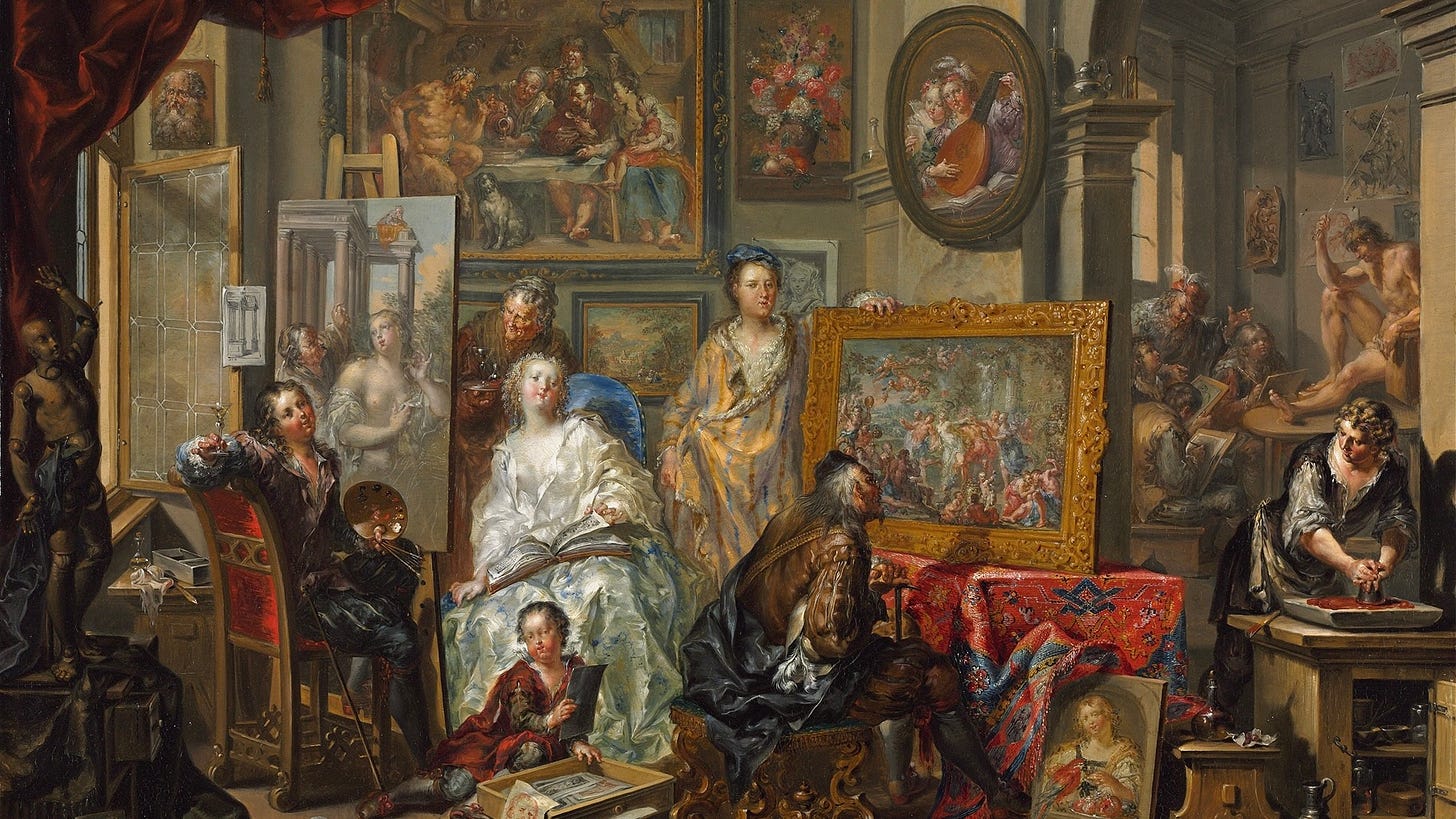Welcome to CrowdSource, your weekly guided tour of the latest intellectual disputes, ideological disagreements and national debates that piqued our interest (or inflamed our passions). This week: hindsight and value.
Join us! CrowdSource features the best comments from The Crowd — our cherished readers and subscribers who, with their comments and emails, help make Wisdom of Crowds what it is.
The Great American Novel?
The Empire State Building was lit up green in its honor. It’s a staple of high school English classes. It has inspired at least six films and one Broadway musical. It’s F. Scott Fitzgerald’s novel, The Great Gatsby, and it turned one hundred years old on April 10.
Some anniversary takes:
“A Man Possessed by Nostalgia.” Novelist Jordan Castro reflects: “The Gatsby we forget is the Gatsby we should most remember: a man possessed by a fantasy or fixation because his life has become devoid of spiritual significance.”
“Soap Opera Episode.” In a recent post that attracted over 4 million views, science fiction writer Brad R. Torgersen dismissed Gatsby:
“Money, Brutality, and Harm.” Lee Siegel writes: “He is the American self-made man par excellence — Gatz, be! — a testament to capitalism’s moral indifference.”
“Aging Republic.” Alexander Raubo says the book “still reads like a question America hasn’t fully answered. What is America without a frontier? A melting pot? A con man?”
The Test of Time
The Gatsby anniversary suggests a question: what makes a novel great?
The Hundred-Year Test. The English writer Samuel Johnson allegedly argued that if a book is still read more than a century after publication, then it’s a classic. He didn’t actually say that, but his essays do suggest that great literature is literature that’s worth remembering:
Writers are Beholden to the Hype Cycle. “He that is loudly praised will be clamorously censured; he that rises hastily into fame will be in danger of sinking suddenly into oblivion.” (Idler No. 59)
Famous Writers Usually Don’t Deserve to Be Remembered. “Of the innumerable authors whose performances are thus treasured up in magnificent obscurity, most are forgotten, because they never deserved to be remembered, and owed the honors which they once obtained, not to judgment or to genius, to labour or to art, but to the prejudice of faction, the stratagem of intrigue, or the servility of adulation.” (Rambler No. 106)
Only Books that Say Something True about Human Nature Can Hope to Last. “There are, indeed, few kinds of composition from which an author, however learned or ingenious, can hope a long continuance of fame. He who has carefully studied human nature, and can well describe it, may with most reason flatter his ambition.” (Rambler No. 106)
Still, the Hundred-Year Test Makes Sense, even if Johnson didn’t invent it.
A Century is “the temporal limit of living memory,” argues French philosopher Rémi Brague: “It is the halo of possible experience that surrounds the life of the individual. … I can reach back two generations and forward two, but rarely more, to a period spanning what amounts to a century.”
So, if a book is still read one hundred years after publication, that means it has transcended the tastes and fashions of its time.
Brague Goes Further: “No society will endure if some people do not look farther than one century, beyond what an individual can experience.”
Future Value. Last week, OpenAI CEO Sam Altman said that future readers will still prefer human authors over AI-generated writing.
Already back in 1960, when Gatsby turned 35, critic Arthur Mizener declared it a classic.
Universal Gatsby
Evidence that Gatsby has contributed to our understanding of human nature:
Global Gatsby
Gatsby’s anniversary was also commemorated abroad.
India. Writes Aishwarya Khosla: “ … the green light at the end of Daisy’s dock still glows … across India too, where dreams of reinvention clash with the realities of caste, class, and economic disparity.”
Spain. Fitzgerald is “the supreme chronicler of collapse,” writes Carlos Boyero.
Argentina. “Talking about The Great Gatsby is like talking about ‘Cambalache,’ writes Facundo Tisera, alluding to a famous Argentine tango. “… it remains relevant in relation to a social reality built on vanity, money, convenience, fleeting friendships, appearances, and detachment.”
Bolivia. Says Pablo Deheza: “… a century after its publication, The Great Gatsby is not only a literary work, but a mirror of human aspiration and despair.”
Paraguay. Coincidentally, this month, playwright Luz Saldívar produced Yo, Zelda, a play about Fitzgerald’s wife, Zelda Sayre.
Imitated Gatsby
Gatsby inspires spinoffs.
Prequel. Michael Farris Smith gives Gatsby character Nick Carraway a backstory in the novel Nick (2021).
Fantasy. Nghi Vo reimagines the character Jordan Baker as a Vietnamese immigrant in The Chosen and the Beautiful (2021).
Politically Relevant (?) Gatsby
Everywhere, people connect Gatsby and Donald Trump:
And, of course, in the US media: in the Atlantic, the Chicago Sun-Times, America magazine and (in 2015) CNN.
From the Crowd
Two intense responses to Tom Barson’s recent essay about Trump, Dietrich Bonhoeffer, our political moment and the sacrifices we might be called to make:
False Dichotomies. John Wilson writes:
I’m a bit put off by the false dichotomies this article references. Arresting students who disrespect a campus by destroying its grounds and using them for unintended purposes does not seem an overreach to me. I don’t care how just your cause is, this concept of protest (camping illegally, trashing property, disrupting academic activities so you can shout in people’s faces) should insult any free-speech absolutist, or American citizen. I should know, I am both.
The irony of “I made a donation to the defense fund for Mahmoud Khalil. But the question came back at me, even before the last click. Did I wish to make the donation anonymous?,” as some fear-mongering Nazi prophesy. Remember the far more real days when the woke mob was 100% more likely to form up loyalty assessment boards and send you off to social exile (because they didn’t have a gulag, thank God)? I do. By all means put your name down, nothing will come of it except for the drama in your mind.
American Gulag. Gemma Mason responds to John Wilson:
The Trump administration does have a gulag, though. It’s in El Salvador. The administration has already claimed in court that if they send someone there by mistake there is nothing they can do to get them back.
Non-citizens who cross American borders, whether legally or illegally, are clearly at risk if they take actions that criticise the Trump administration. Perhaps these powers will never be used against citizens. Even if you think so, I still think you’re wrong to compare “social exile” to government repression of speech, especially if you think the possibility of the former justifies ignoring the risks presented by the latter.
There’s a lot of sharp exchanges in the comments section to Tom’s article, so be sure to check out the whole thing.
See you next week!
Wisdom of Crowds is a platform challenging premises and understanding first principles on politics and culture. Join us!






Such is my luck to get a shoutout on one of my less generous opinions/interactions. Thanks all the same!
I will have to give Gatsby another read... I feel like I did in my 20's... may as well again in my 30's!